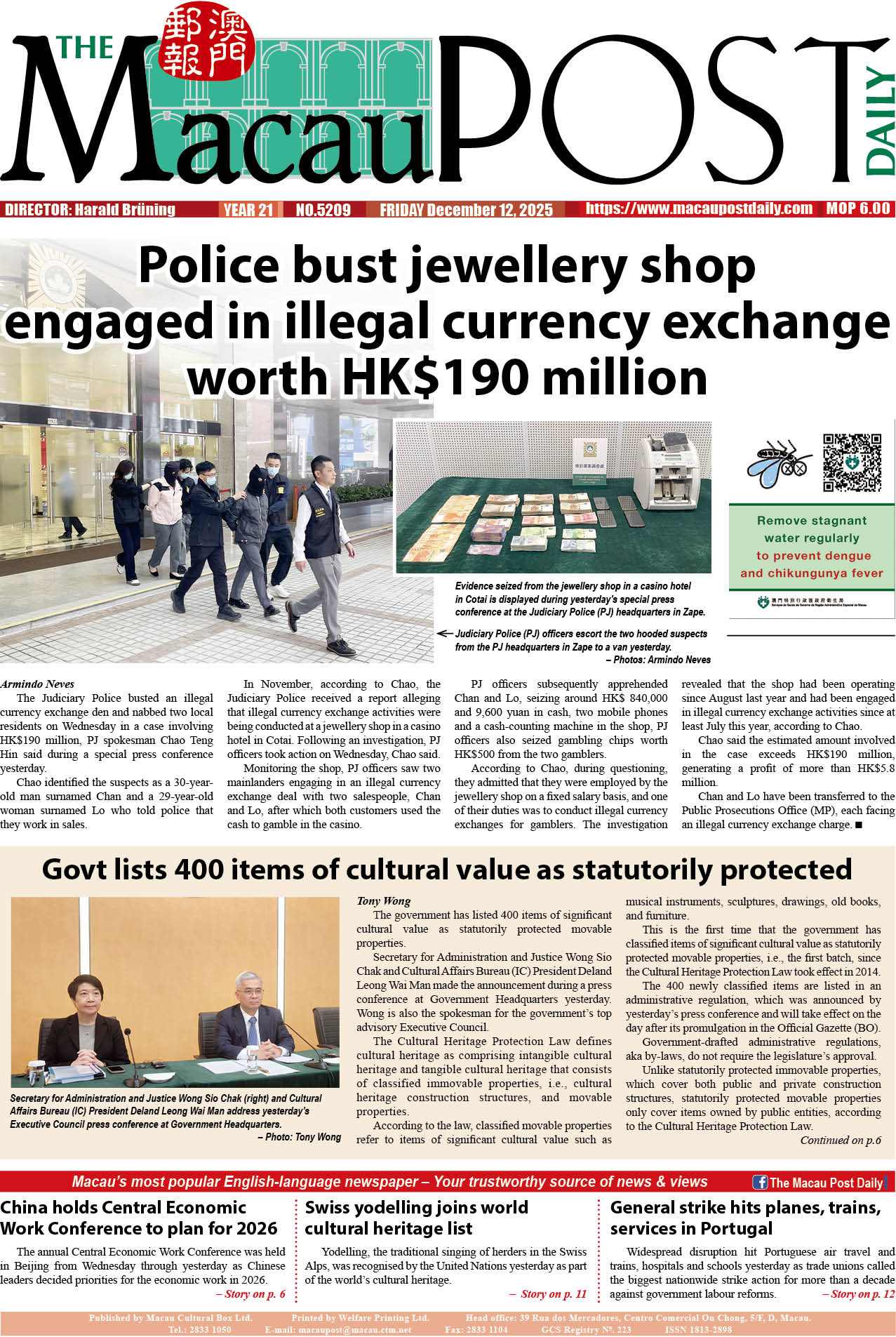National security committee to assess candidates’ allegiance
The Macau government has submitted a bill that proposes amendments to the Chief Executive Election Law to the Legislative Assembly (AL).
The amendment bill proposes that the Committee for Safeguarding National Security of the Macau Special Administrative Region (MSAR) will be tasked with assessing whether chief executive election candidates uphold the MSAR Basic Law and bear allegiance to the People’s Republic of China (PRC) and the MSAR.
In addition, the amendment bill also proposes to criminalise those who publicly incite others to cast blank or invalid votes, or to abstain from voting, in the chief executive election.
The MSAR chief executive election is held every five years. The head of the MSAR is elected by a 400-member committee.
Secretary for Administration and Justice André Cheong Weng Chon, who is also the spokesman for the government’s top advisory Executive Council, announced during a press conference at Government Headquarters on Friday that the local government had finished drafting the amendment bill with the aim of ensuring the full implementation of the “patriots governing Macau” principle.
The amendment bill was uploaded onto the website of the legislature yesterday, which is yet to schedule a plenary session for the debate and vote of the bill’s outline.
The debate and vote of the amendment bill’s outline can only be expected to take place in the second half of October at the earliest as the legislature starts its two-month summer recess today which will end on October 15.
While the current version of the Chief Executive Election Law stipulates that a chief executive election candidate must uphold the MSAR Basic Law and bear allegiance to the PRC and the MSAR, it does not require the candidate to sign a declaration confirming his agreement.
The amendment bill proposes to require chief executive election candidates to sign a declaration confirming that they uphold the MSAR Basic Law and bear allegiance to the PRC and the MSAR.
In addition, the amendment bill proposes that when the Chief Executive Electoral Affairs Commission (CAECE) is assessing chief executive election candidates’ qualifications, it will be required to request the Committee for Safeguarding National Security of the MSAR to assess whether the candidates uphold the MSAR Basic Law and bear allegiance to the PRC and the MSAR.
The amendment bill proposes that if the CAECE decides to disqualify a chief executive election candidate after the Committee for Safeguarding National Security of the MSAR has concluded that he or she does not uphold the MSAR Basic Law or has been disloyal to the PRC or the MSAR, the respective candidate cannot file an appeal to the CAECE nor the courts against the decision.
Most of the 400-member committee that elects the chief executive, officially known as Chief Executive Election Committee, are elected by registered association representatives.
Every five years, the election of the Chief Executive Election Committee is held a few months before the chief executive election.
Different to candidates of the MSAR Legislative Assembly election – who already are formally required to uphold the MSAR Basic Law and bear allegiance to the MSAR, the current version of the Chief Executive Election Law does not require members of the Chief Executive Election Committee to uphold the MSAR Basic Law and bear allegiance to the MSAR.
The amendment bill proposes that members of the Chief Executive Election Committee will also be required to uphold the MSAR Basic Law and bear allegiance to the MSAR, as well as to sign a declaration confirming their agreement.
The amendment bill also proposes that the Committee for Safeguarding National Security of the MSAR will also be tasked with assessing whether candidates for the election of the Chief Executive Election Committee uphold the MSAR Basic Law and bear allegiance to the MSAR.
Moreover, the amendment bill proposes that after the Committee for Safeguarding National Security of the MSAR has concluded that a chief executive election candidate does not uphold the MSAR Basic Law or has been disloyal to the PRC or the MSAR, he or she will be ineligible to stand as a candidate for the next five years. The bill also proposes that the five-year rule will also be applicable to candidates for the election of the Chief Executive Election Committee.
This file photo shows the chief executive election at the Macau East Asian Games Dome in Cotai on August 25, 2019, when all the 400 members of the Chief Executive Election Committee attended. – Photo: Xinhua






